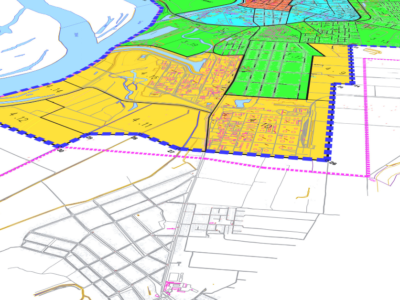The Rights of Neighbors After Re-Zoning Decisions
November 18, 2020
By Cody W. Lyons
Zoning is a vast and complex arena of law which can be discussed at length; this article merely highlights the rights of property owners and the procedures to follow when a property owner has been victimized by an unfavorable re-zoning decision. Generally, zoning commissions are bound by a comprehensive plan, which is designed to operate as a guidebook for future uses of land based on present and foreseeable needs of the community. However, local zoning boards are given a large amount of discretion and too often stray away from the comprehensive plan when doing so suits their personal interests or preferences.
Zoning boards frequently approve rezoning applications, which negatively affect the rights of neighboring property owners. Before conducting a hearing on a re-zoning application, the local government is required to publish notice at least 15 but not more than 45 days in advance of the hearing. The notice must provide the location of the property, the current zoning classification, and the proposed re-zoning classification. The notice and hearing requirements must be strictly complied with, as courts are quick to invalidate zoning decisions in the absence of adequate notice or a proper hearing.
If the procedural requirements are observed, however, zoning boards have relatively broad discretion in granting or denying re-zoning applications. For instance, it is not an uncommon situation for a re-zoning applicant to request permission to establish a land-altering use such as a landfill or airport directly adjacent to residentially zoned areas. In situations like these, the hearing procedures provide an aggrieved property owner with the forum to voice his or her concerns to the zoning board and provide evidence of harm that will be caused to nearby property owners if the re-zoning application is approved. Arguments that the re-zoning itself is unconstitutional must first be mentioned to the zoning board, as courts are generally unwilling to hear such an argument if the zoning board has not previously been given the opportunity to consider the constitutionality of its zoning decision. If a re-zoning application has been granted over the objections of neighboring landowners, certain avenues still exist for landowners to contest and invalidate an adverse zoning decision.
If the zoning board ultimately grants a re-zoning application, neighboring landowners may turn to the courts in a final attempt to prevent the zoning decision from being implemented. After an adverse zoning decision has been made, property owners who hope to reverse the decision must file suit within 30 days of the zoning hearing. The property owner must sue both the governing authority who granted the application and the successful re-zoning applicant, as they are both considered indispensable parties. If a landowner follows the proper procedures and files suit, he or she may request the court to reverse the zoning decision; however, a heavy burden must be overcome before courts are willing to reverse a local government zoning decision.
Generally speaking, courts afford much deference to local zoning decisions and will only reverse a zoning board’s decision in limited circumstances. In a 2008 ruling, the Georgia Supreme Court detailed the elements that must be proven prior to a court’s exercise of authority over zoning decisions. In Stendahl v. Cobb County, the Court held: “In order to have a superior court invalidate the re-zoned classification of a neighboring property, the complaining party must show the zoning change abridged the complaining party’s constitutional rights, the re-zoning decision was the result of fraud or corruption, or the re-zoning power was manifestly abused to the oppression of the complaining party.” Without a showing that the zoning board committed at least one of these infractions, courts have no authority to reverse a zoning decision, and the re-zoning will be held valid and constitutional.
It is apparent that the law favors the administration of zoning and land use to take place at the local level, evidenced by the presumption that zoning decisions are valid, as well as the deference given to zoning boards. However, landowners who are harmed by zoning boards still have options available to prevent or lessen any possible harm. If you believe you will be impacted by a zoning decision it is important to immediately consult with an experienced attorney, as there are many procedural requirements and time limitations that, if not strictly followed, can prevent you from seeking any sort of remedy for the negative impact that threatens you.
Cody W. Lyons is an associate at Flint, Connolly & Walker LLP having recently graduated from the University of Georgia School of Law (Class of 2020). If you need advice or assistance regarding re-zoning issues or other real estate matters, the attorneys at Flint, Connolly & Walker, LLP have the knowledge and expertise to help you.

